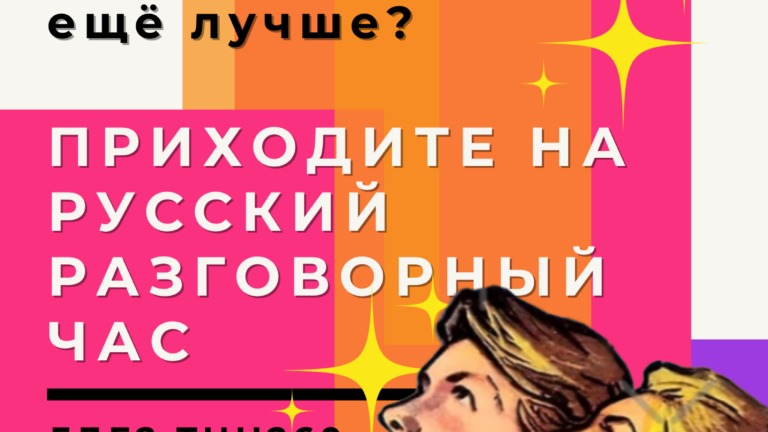Students entering USC with some knowledge of Russian are encouraged to contact Prof. Evgeny Dengub <dengub@usc.edu> to take a placement test to determine their proper course level.
Russian Conversation Hour (Русский разговорный час)
Russian Conversation Hour (Русский разговорный час) meets weekly in Taper Hall 260. Join us for tea, cookies, conversation, and fun activities!
Вы говорите по-русски? Хотите говорить ещё лучше? Приходите на Русский разговорный час!
Join our Russian Conversation Hour to embark on a journey of discovering Russian language and culture of Russian-speaking countries:
• Thematic Meetings: We host conversational sessions led by USC faculty on a variety of cultural topics. Each meeting brings something unique to the table.
• Connect and Learn: Engage in our activities to expand your language skills, immerse yourself in Russian-speaking cultures, and make new friends.
• All level friendly: We welcome all, from beginners to advanced speakers, as well as heritage speakers for discussions of a wide range of topics tailored so that everyone can get engaged.
Check our Schedule of Events for the day and time, which are updated each semester.
До скорой встречи! Вопросы? Пишите Саше Пчелинцевой pchelint@usc.edu


Russian Language Courses
At USC, you can engage in learning the Russian language at any stage, whether you are a complete Beginner, an Intermediate or Advanced speaker, or a Heritage learner (i.e., if you grew up speaking some Russian).
Our language courses will help you to be able to:
- Write and converse in Russian at the Intermediate Mid to High level, as defined by the American Council on the Teaching of Foreign Languages (ACTFL) guidelines, and at the Advanced Low to Mid level after at least one semester of study abroad;
- Comprehend contemporary Russian—written and spoken—to a degree permitting the understanding of texts and ideas relevant to disciplines beyond language study;
- Analyze and respond to complex texts through critical close reading;
- Engage in research in the field using primary and secondary sources; and
- Generate original ideas and insights using knowledge of the Russian language and critical skills acquired through the study of Russian history and culture.
Our program is oriented towards teaching conversational Russian; class size is small and students receive maximum individual attention. Courses are enriched by a wide variety of extra-curricular events, including festivals of Russian film and animation, Russian Conversation Hour, and other events.
Courses (4 units)
RUSS 120 and 150 (Beginning Russian I and II)
Beginning of four-skill language course. Russian spoken in class, grammar introduced gradually. Regular written assignments to develop proficiency in all four language skills. No previous language experience required.
RUSS 220 and 250 (Intermediate Russian I and II)
For students with some previous study of Russian (Russian 120 and 150 or outside study). Focus on solidifying linguistic performance by creating with the language to produce unrehearsed, meaningful exchanges of information. Refining of structural knowledge and expansion of vocabulary within the context of Russian culture. Authentic texts and films are used to create context for reviewing and expanding grammar, syntax and vocabulary knowledge.
Upper division:
RUSS 310 Advanced Russian in Popular Culture
SLL 321 Russian Culture, or
SLL 330g Russian Thought and Civilization
SLL 340 Intercultural Communication in Russian
SLL 465 Seminar in Russian Studies
Meet Jinglin Yuan, a graduate student at USC studying public diplomacy. After just one semester of studying Russian, he speaks easily about his interest in Russian literature and shares why his Russian class was his favorite.
Meet Sophia Wittmeier. Listen and read about what she plans to do with her minor in Russian.
“My name is Sophia Wittmeier. I just completed my degree at USC with a major in Intelligence and Cyber Operations and a minor in Russian, and I will be moving to Washington, DC to begin a career in cyber security. I took my first Russian class my sophomore year at USC and immediately added a Russian minor. The Russian program at USC is run by exceptional professors, who teach the language and culture in an effective and dynamic way that makes classes really fun. The fantastic professors, amazing students, and small class sizes all contribute to an extremely conversational environment, which both very much helps in learning Russian and also makes it extraordinarily enjoyable. Prior to taking Russian at USC, it was hard for me to imagine that acquiring an extremely solid grammatical foundation in such a complex foreign language would be such a blast. I highly recommend taking a Russian class at USC!”
Meet Chris Gunning, USC Russian Major, Class of 2024. Chris is in Moscow studying for a MA degree in Cybersecurity. Listen to his insights on how learning Russian enhances career options in the military and helps expand one’s worldview.
Russian Language Program Director
A native speaker of Russian, Professor Evgeny Dengub holds a doctorate from Bryn Mawr College in Second Language Acquisition in Russian.
He is the co-author of three Russian language textbooks: Etazhi: 2nd year Russian Language and Culture (2021, Georgetown UP), Russian for Advanced Students (2013, Dunwoody press) and Panorama: Intermediate Russian Language and Culture (2017, Georgetown UP), which received AATSEEL prize for Best Contribution to Language Pedagogy in 2019.
Dengub has created and led a variety of workshops and trainings for teachers both in Russia and the United States and has supervised the work of teaching assistants at Amherst College and University of Massachusetts. For a number of years he directed a STARTALK Institute for teachers of Russian at Middlebury College Russian School where he has worked as a lead instructor and a testing coordinator for more than a decade.
As an active OPI, OPIc and WPT tester and rater, Dengub possesses thorough knowledge of ACTFL Proficiency Guidelines, the oral proficiency test protocol and proficiency-based instruction. He is a member of the Board of Directors of the American Councils of Teachers of Russian (ACTR).
You can reach Evgeny by email at dengub@usc.edu.